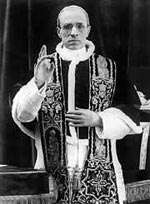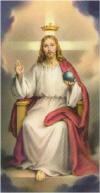In America one is accustomed to seeing religious figures condemn evolutionary theory and argue that teaching evolution is incompatible with Christianity. Catholicism, however, not only doesn’t reject evolution but in fact has supported evolutionary theory for quite some time - Pope John Paul II even expressed some support for it. This continues to surprise people because it’s simply not reported in the news very often.
 In 1950, Pope Pius XII wrote in his encyclical Humani generis:
In 1950, Pope Pius XII wrote in his encyclical Humani generis: “The Teaching Authority of the Church does not forbid that, in conformity with the present state of human sciences and sacred theology, research and discussions, on the part of men experienced in both fields, take place with regard to the doctrine of evolution, insofar as it inquiries into the origin of the human body as coming from pre-existent and living matter.”
[The full encyclical can be read here: http://www.papalencyclicals.net/Pius12/P12HUMAN.HTM]
 On October 23, 1996, Pope John Paul II said in a speech to the Pontifical Academy of Sciences:
On October 23, 1996, Pope John Paul II said in a speech to the Pontifical Academy of Sciences: “[N]ew findings lead us toward the recognition of evolution as more than a hypothesis. In fact it is remarkable that this theory has had progressively greater influence on the spirit of researchers, following a series of discoveries in different scholarly disciplines. The convergence in the results of these independent studies—which was neither planned nor sought—constitutes in itself a significant argument in favor of the theory.”
“A theory is a meta-scientific elaboration, which is distinct from, but in harmony with, the results of observation. With the help of such a theory a group of data and independent facts can be related to one another and interpreted in one comprehensive explanation. The theory proves its validity by the measure to which it can be verified. It is constantly being tested against the facts; when it can no longer explain these facts, it shows its limits and its lack of usefulness, and it must be revised.”
[To read Pope John Paul II's words on the matter: http://www.ewtn.com/library/PAPALDOC/JP961022.HTM]
None of this necessarily means that Pope John Paul II accepted evolution as a fact and it certainly doesn’t mean that Catholics are required to accept evolution as a fact. John Paul’s address was designed to explain the Vatican’s theological position on human origins, not the Vatican’s position on science. The address wasn’t meant to be either an endorsement or (obviously) a condemnation.
 Instead, the address was meant to lay out for Catholics a basis for accepting evolutionary theory. There are many scientific facts that the Catholic Church doesn’t require Catholics to accept — that the Sun in as the center of the solar system and that the Earth is round, for example. The truth of these statements is obvious to everyone, but that doesn’t make them appropriate for religious doctrine either.
Instead, the address was meant to lay out for Catholics a basis for accepting evolutionary theory. There are many scientific facts that the Catholic Church doesn’t require Catholics to accept — that the Sun in as the center of the solar system and that the Earth is round, for example. The truth of these statements is obvious to everyone, but that doesn’t make them appropriate for religious doctrine either. On a practical level, evolutionary theory is taught without reservation at Catholic educational institutions. This has been a problem because the general anti-evolution trends in American society has made teaching evolution more difficult, even at private Catholic schools. This has led to calls for more detailed teaching about evolution in these schools. David Byers, executive director of the U.S. bishops' Committee on Science and Human Values from 1984 to 2003, has said that, “Denying that humans evolved seems by this point a waste of time.”
My note: He expressed the Catholic position on the subject of evolution very well. This author is a contributor to About.com is an Agnostic/Atheistic 'guide'. I wanted to show that someone who is NOT Catholic grasps the Catholic concept of the acceptance of the THEORY of evolution. I, even as a Catholic, am free to make up my own mind about it. As I have said, I believe there is a lot of validity to evolution within species, however, the THEORY of evolution does NOT account for the beginning of life nor does it account for the complexity thereof. [bolding, italics, brackets mine]
No comments:
Post a Comment